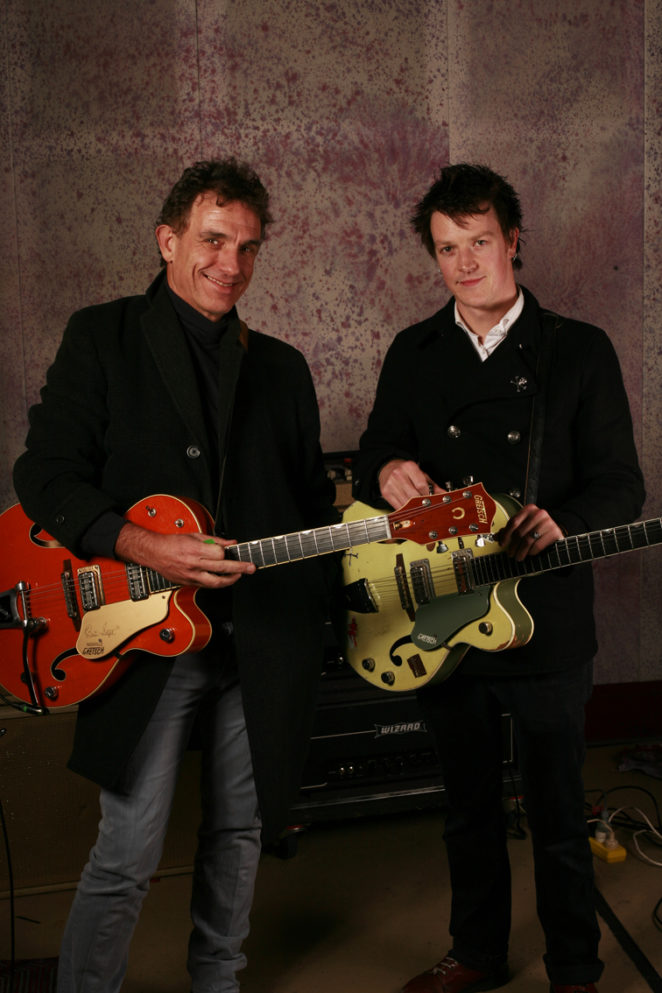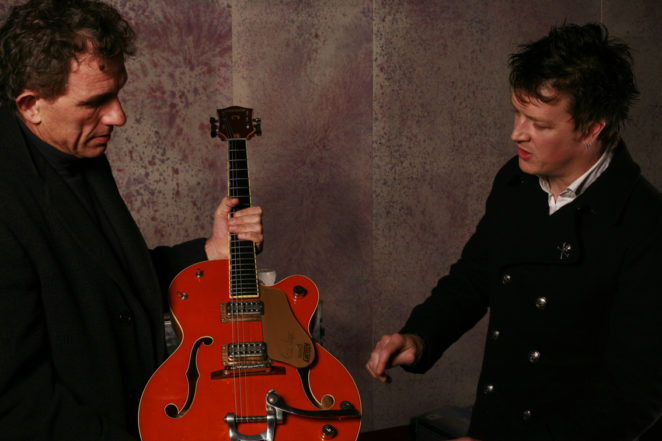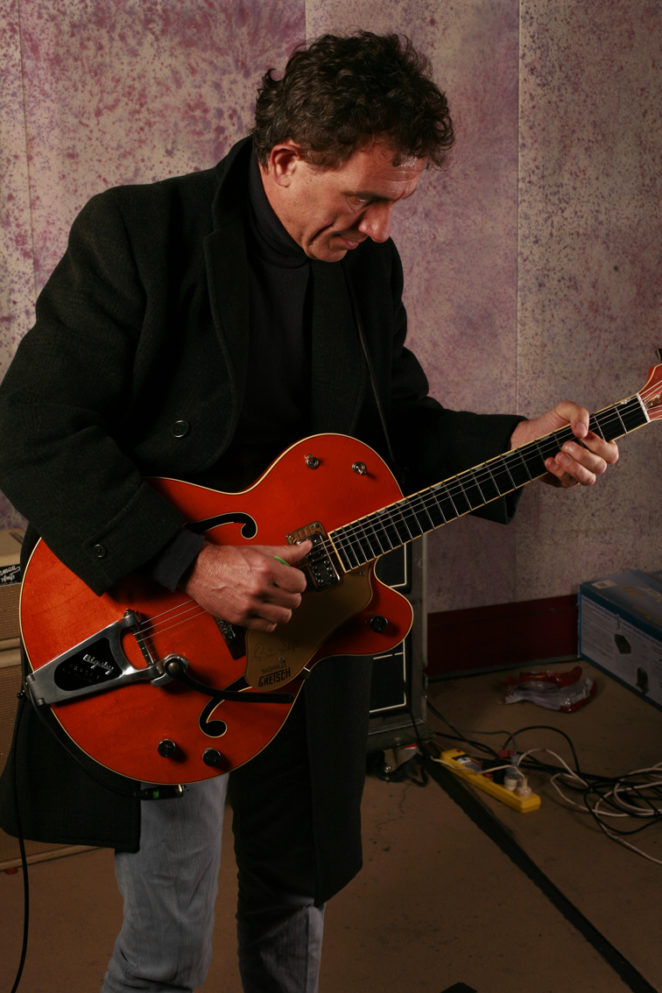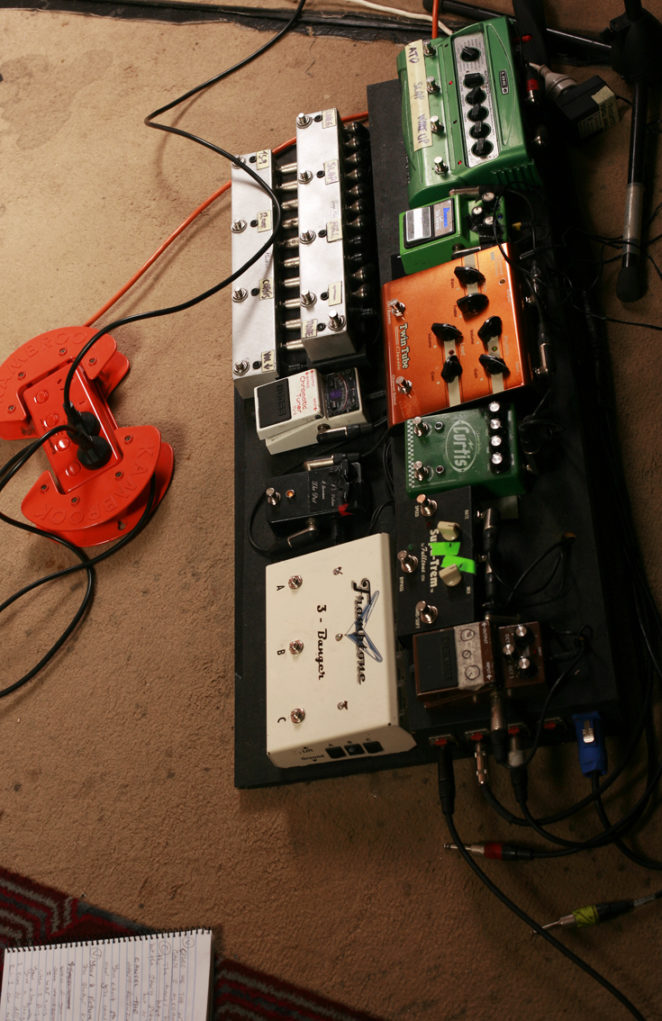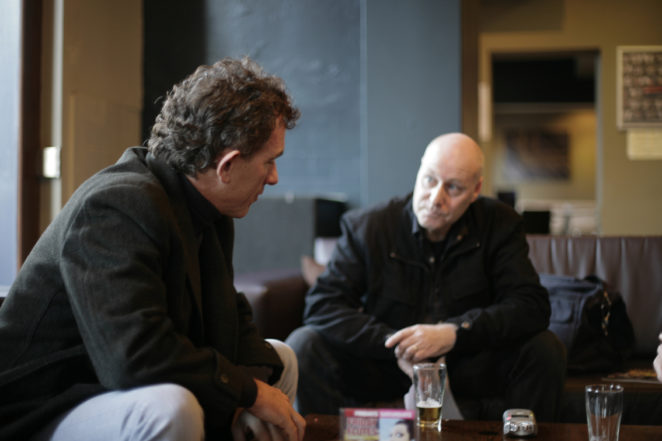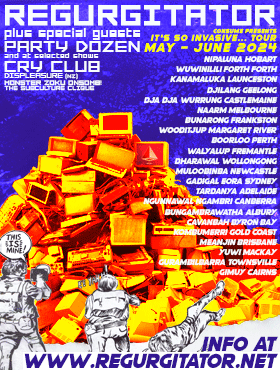IAN MOSS & CHRIS CHENEY TALK GUITAR!
September 10, 2007 | Author: Greg Phillips. Photos by Marty Williams
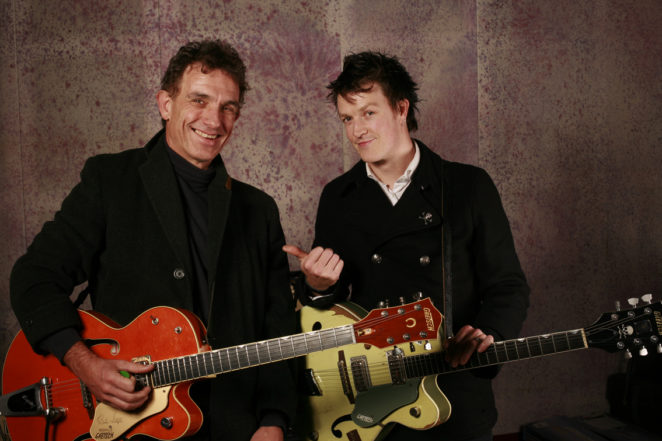
The ABBA tribute band was churning out passable cover versions of the Swedish icon’s hits in an inner suburban rehearsal complex, oblivious to the fact that today, two of Australia’s all time guitar legends were their studio neighbours. While Chris Cheney openly admitted to being an ABBA fan, the ‘fret’fully talented duo of Moss and Cheney decided they’d be more easily heard chatting over a beer at the nearby pub. Mossy, rugged up in a trenchcoat was hampered by a cold, but nonetheless obliging and happy to sit back on a comfy couch and talk guitar. Cheney, a huge Chisel fan, was wide eyed, all ears and eager to gain the answers to many Chisel questions he’d often pondered. Greg Phillips reports
As Powderfinger seeped out of the pub’s PA, I put it to the guys that they both seemed to be more about their own tone and technique than relying on gadgets for their sound.
IM: I started off just going straight into an amp. This was back in Alice Springs quite a few years ago and I didn’t actually have a whole bunch of gadgets at my disposal anyway. So if you did come across something, it was like wow! The first thing I got was a JEM Treble Booster which I think was made by an Italian company. It was like a little cube with the jack coming out of it. You actually stuck that into the guitar, which was a little Maton, that was my first electric. Anyway there was that into a Fender 45 watt which I’d turn not much higher than 3 or 4, and I’m not sure whatever the characteristics of that Fender used to be, but it used to howl. But with this amp, just one valve would take off, the output valve. So you’d replace the valve and the same thing would keep happening. There was no one in Alice Springs who could fix those things, so I sent it off to Adelaide. The guy said he’d done this and that and it wouldn’t happen again. It didn’t either, but also it never sounded the same again.
CC: The thing with me was that I started out listening to a lot of that 50s and 60s rockabilly stuff, a time when the effects probably weren’t even invented apart from delay and echo. So I kind of didn’t come from a background where there were a lot of effects. It was always like, make the sound with your fingers first, and I still believe in that to a certain extent. I think for people starting out, it is so much better just plugging into an amp and it’s clean and you’ve either got it or you ain’t. You’re not masking anything and I’m really glad that I learnt to play that stuff first. It’s just all about the clarity. I’m really glad I learned to play guitar by listening to Eddie Cochran and Gene Vincent and early Elvis Presley records because it’s so honest.
GP: How much did you both concentrate on finding your own guitar voice?
IM: I never really thought about it. I just agree with Chris, before you go near pedals or anything, just plug in and start playing.
CC: For me, it was a kind of a schizophrenic thing. I could never decide what I wanted to be. Kind of like how I am in life. I tried to do the lot. I was always like, why can’t I love Buddy Holly and Led Zeppelin equally? I think that is what helped me find my voice, just trying to play a little of everything. Jack of all trades but master of none! But I definitely tried to find a common ground. I was always a big Chet Atkins fan. Always wanted to be able to use my right hand fingers and play that dead thumb Merle Travis stuff. But then I wanted to be able to play rock stuff as well. I can listen to Merle Travis and AC/DC back to back and get the same out of it and I think that’s how I have approached my guitar playing. But I guess you just play and over a period of time, your own style just happens.
IM: Like we were saying when you are young and first starting out, you listen to your heroes. For me it was Alvin Lee, trying to learn Ten Years After’s I’m Going Home. I was living in Alice Springs at the time and had never heard of hammer-ons.
CC: So you were thinking how the hell was he doing it? Trying to slow it down, break it down?
IM: It was all hammer-ons and pull-offs. I just assumed that every note had to be picked.
CC: That’s a great way to do it though, quite often you will try to reproduce something and you do it in a completely different way and it’s only going to better your own playing or frustrate you immensely. That’s the way you find your own thing isn’t it. I remember people talking about all the echo and stuff on those 50s recordings like Les Paul and one of my heroes Danny Gatton. He learned to play the echo by flicking his fingers double time to make that sound before he knew it was just this tape delay. It’s pretty wacky stuff.
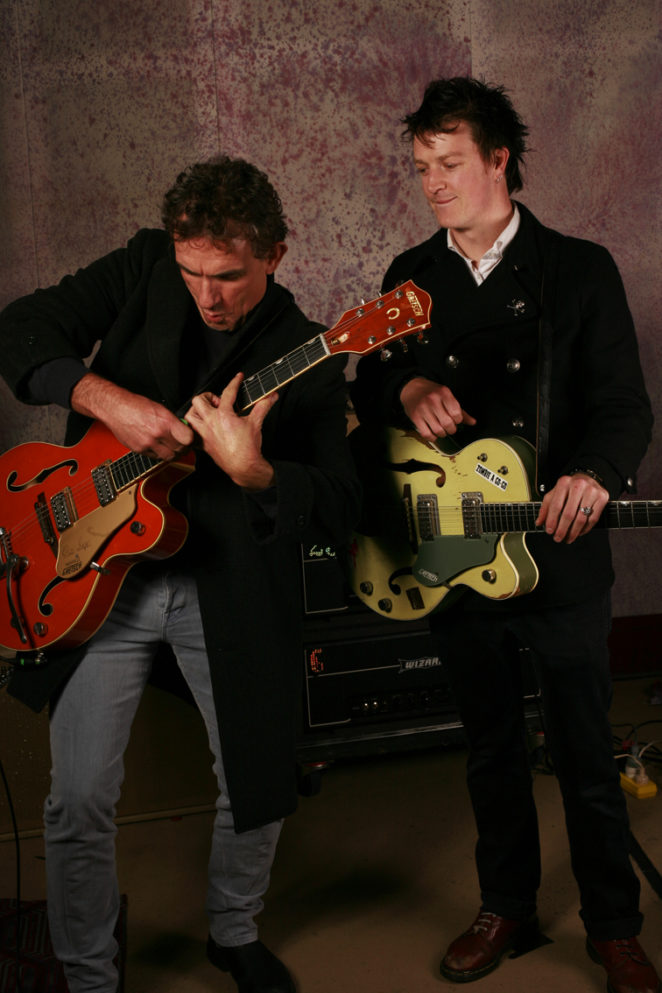 GP: Let’s talk about solos, because Ian, you have played some of the most recognisable solos in Australian music. How hard did you work at the Chisel solos?
GP: Let’s talk about solos, because Ian, you have played some of the most recognisable solos in Australian music. How hard did you work at the Chisel solos?
IM: You could probably count on one hand getting what I was trying to achieve … and that was being completely spontaneous, and getting so lost delivering the solo that … The ideal thing is that you get so lost in it that you are unaware of what you’re doing, just immersing yourself in it. You get to the end of it and you don’t even know what you played. You listen back to it and think, shit I didn’t even know I had done that. That kind of happened once or twice.
CC: I’m interested to know with Chisel, a band with keys and stuff … if you were working on a song, did you go to the guys and say I have an idea for a solo here or was it down to the guys saying ‘OK, here’s the point of the song where we need the guitar solo?’ For us being a three piece it’s kind of a routine thing because playing that 50s type thing every song has to have this blazing guitar solo, which is fine by me, but I was wondering with the keys and other elements whether the solo was something you’d always be pushing?
IM: Well for the first three albums at least, Don Walker was the songwriter for Cold Chisel and he wanted it to be a guitar band. So he pretty much made sure there was a guitar solo in every song. He was pretty selfless and underestimated his own talents and would rarely allot himself a keyboard solo. He’d just say, no we are a guitar band. So luckily I didn’t have to push for it …. with the powerhouse of personalities in Cold Chisel I would never have got anywhere!
GP: Ian, you’ve gone into this acoustic phase. Is that a career shift or just what you are doing at the moment?
IM: More the latter. I certainly haven’t chucked in the electric guitar by a long shot. It’s just one of those things. The opportunity came up. Liberation Blue are doing this thing where they say, OK all you guys that have been rock stars in the past, you’re doing nothing now, what about doing acoustic versions of all those hits you’ve had.
CC: It’s a different approach though isn’t it. I was talking about this with Greg before you were here, and I’m not very fluent with an acoustic guitar. Even though you can play guitar, you have to approach acoustic guitar really differently. There’s a whole different approach, that’s if you want to go that way. I think there are some amazing acoustic guitar players out there and I’m just boggled by how they play. I’m just more in the electric guitar solo kind of thing. That whole acoustic fingerstyle thing amazes me.
IM: I kind of do a pseudo thing too, but never had the discipline you’re talking about. There are certain patterns you should learn.
GP: Ian gets this fantastic dreamy, dirty Dobro sound on ‘Flames Trees’ on the album
IM: Well that was my first and only use of the resonator. It’s pretty raw! That was more than just a resonator, it was plugged through a little Hi Watts amp… 20 watt, 40 watt switchable, 2x 12 cabinet. They’re really cool. With that song, I set up the whole feel first and the Dobro thing was put on later.
CC: It’s funny you know, we were talking about the guitar solo thing before. I always get people asking about the idea of the guitar solos. It seems to me that the guitar solo is not something that is actually done as much anymore, particularly with younger guitar players. They’ll say I really like the fact that you have solos. For us it was always a standard thing. I never thought about it. Starting out playing all of that Sun sessions stuff that we did, it was just part of the song. You have your intro then your have your verse and chorus and then you have your guitar solo. It’s not as common a thing now. It’s like ‘let’s put a guitar solo in there’, like it’s this evolutionary thing. It’s weird the way music has gone and for some people the idea of a guitar solo is left of centre.
IM: It seems to have been like that for a long time. For someone like me who switches on the radio every now and then, I’ve been waiting for years now. It’s almost like there is a rule out there for the top 40 stuff not to have guitar solos. It’s gone on for far too long now. So I’m trying to work out if guitar solos are uncool or what’s going on?
CC: That’s where it’s come from hasn’t it? The whole grunge thing came in and said death to the guitar solo. The whole hair metal thing didn’t really help the situation, but you know if it’s done the right way and tastefully…
IM: Yeh, I hear what you are saying. There is plenty of overkill with solos that just go on forever and not particularly interesting but just give me 8 bars of something really tasty and to the point, but at the moment there is not even that. Nothing!
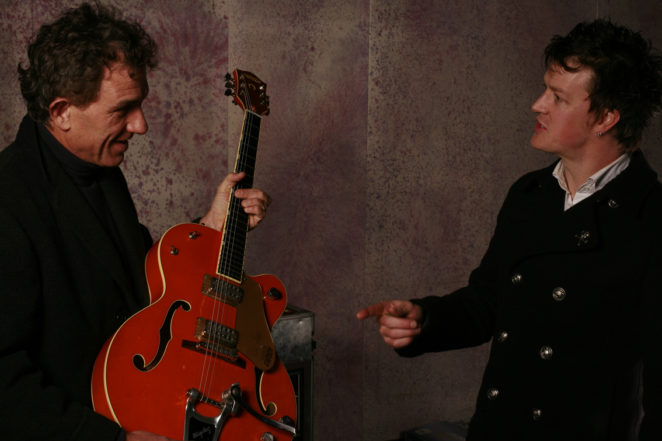
GP: Let’s talk about ‘Rising Sun’ the track that Living End did on the Cold Chisel tribute album. Do you remember much about recording the original?
IM: We were going through a Jerry Lee Lewis phase … it was one of those times where we were starting to expand and it wasn’t all about Free and Led Zeppelin. We were thinking let’s go back and we went through a bit of a rockabilly phase there. It was my idea, that rough … stringing a couple of licks together. There’s a couple of tricks there. I think I’d learnt something off Tommy Emmanuel, you know .. hold the B string up and move your little finger around on the E string and get this pseudo pedal steel thing happening. Chuck a couple of those in there and the rest is just going for it and seeing what happens.
CC: Which is the way that music should be played. I don’t reckon you want to have the solo perfectly worked out. It should be like a train wreck is about to happen, and when you just get through it, that’s when the music is most exciting.
IM: Exactly, that’s what it is all about … skating on the edge.
CC: So you would have an idea about the kind of solo you wanted to play and then go for it. I was always fascinated with that track when I heard it because it had that thing. I was the only kid in the neighbourhood who was into that kind of music. When I heard that track I thought, ‘man this is fantastic’. I didn’t realise that Cold Chisel could play that kind of song. Those licks had all those country bends. I wondered whether you had been listening to that kind of stuff or whether it was already in you from growing up. Was it like … ‘I will listen to some old records for this solo’? When I approached the solo in our version I just grabbed your bit and did a couple of things with it, because it already had that rockabilly thing. It’s like a Scotty Moore pull off lick that you’d put on it, and I thought I’m going to keep that in there because it just works.
GP: What did you think of the tribute album?
IM: I still haven’t heard the whole thing, but without pissing in Chris’s pocket, I think Living End did a great job, an excellent job
GP: It really suited the band
IM: Yeah, it did
CC: Well that’s our thing. That’s the kind of music we learnt to play our instruments on. So when the idea came up of doing a Chisel track, we just said it has to be that one, and remind people about where this band came from. We’ve kind of evolved as well into more of a pop thing. We try to cover a lot of different ground but we just had to do that track as a ballsy rockabilly tune and just have fun with it and get the slap bass back in there, and the slap echo on the guitar and get that really Gretschy sound. I was rapt when we got the opportunity to play that song. We recorded it live. When we finished we thought, this is the kind of song we need to be writing. It’s such a great song and these guys had so many killer tunes and a lot of great party songs like that, and you would have just blown the roof off the joint with that.
GP: So the main guitars that you use, are there any romantic tales to how you come across them?
IM: Well I chop and change so much. I have one that I really like made by Greg Fryer, a luthier from Sydney, but romantic stories no. Probably tragic stories. Having bought an original ‘62, ‘63 salmon pink Stratocaster off a mate in Alice Springs in 1978 which cost me $250. It was 100% original. Then I went through that silly guitar player thing of being happy for about 3 months, then have to change everything. So I started pulling this thing apart. It was the beginning of that whole spare parts thing, Schecter was the leading brand for that. My thinking was that the body was too light, got to get a heavier body for more sustain. You know it was that Spinal Tap thinking,.. “You can go and get a bite and come back and it’s still ringing”. So yes, I hacked it. Replaced this beautiful Strat body with a Schecter body made of African walnut and wondered why it sustained everything above 15k. It was so rock hard, no warmth at all. I was thinking there was something wrong with my amp. Pretty ignorant days. Then trying different pickups, and finally I realised it was this ridiculous lump of African walnut that weighed a ton and had no tone whatsoever. Having said that I had a great telecaster neck made out of the same stuff and that worked really well. But in those days I had no idea how the value of these things was going to go through the roof. It’s just over the top the value of old guitars, not that Steve Jackson (Sydney vintage guitar dealer) would be complaining. Actually, the first really criminal thing I did to that guitar was to repaint it in this blue burst, midnight blue, then I got rid of it.
GP: What about you Chris? Any guitar horror stories?
CC: Yeah for sure. I’ve got an old mid 60s Gretsch double anniversary that I put a Seymour Duncan Hot rod pickup into. I gave it to our old guitar tech, who is no longer with us. He’s still on the planet but no longer with us. Anyway he gave it to a guy who grabbed a saw and had to rout out a pickup hole on a very thin hollow top body guitar to insert this heavy metal pickup. This was years ago. It ruined the guitar because they cut through the bracing which lost all the resonance of the top. The thing with those guitars is that there are not many of them around. It was like a ’64. I went through a phase where I thought the guitar just wasn’t sounding right and I thought I’ll just put this pickup in. So I got it back and they said, ‘well we had to cut it’. And I’m like ‘OK’. Not only did it devalue the guitar, but it didn’t sound any better. Just that stupid thing of searching for something better.
GP: Ian, have you tried many different pickups?
IM: Yeah, I’ve been through that thing too where I think I have to get more output, more grunt happening. Generally speaking I think the more gruntier pickup you get, you do get the grunt, but you lose any character and tone. It might put out a lot of noise but has no personality to it anymore.
GP: What kind of pickups do you have in your Strat?
IM: They are Fender Custom 69s. They are made the way they made the magnets back in 1969 when Hendrix was playing. They are probably the lowest output Fender pickups you’ll ever see. Generally when you chase the hotter pickup, you go for the bridge position because being close to the bridge there’s less string vibration, particularly with standard Strats. If they are all left at the same height, they are struggling for volume out of the rear pick up. Particularly when it’s angled, the bottom half, the thinner three strings are putting out less vibration, It’s going to be quieter again, so they have done that thing where you invert them the other way. Once again it’s that Hendrix thing because he has a right handed guitar turned left. So Colin Bloxsom, a luthier in Sydney ended up chucking in another thousand turns on this Custom 69 pick up for the bridge position which has boosted it just nicely. He says it specs up to a Telecaster pick up and it sounds a bit like that to me
GP: What about you Chris? Do you experiment with pickups?
CC: Yeah but I’m just not a tech head, I’ll put that right out there now. I don’t know anything about amps and transistors and valves. I know that doing more windings is apparently good for the sound. (laughs)
IM: Gives you more output
CC: I’ve got TV Jones pickups in all my guitars. He’s a guy who does replicas of the Filtertron pickups, which are like the famous Gretsch pickups they had in them. The only problem they had was that they tended to squeal a little, a bit noisy. Basically he just makes them new. He makes a Classic and a Classic Plus, a PowerTron, SuperTron. He has these different levels or grades. I use the Classics because I am into that top end sparkle, that ringing sound when you hit the right chord. Again, because of my guitar style, I am always torn between trying to get the grunt and heaviness there, but I really like the twang as well. I want the E string to have that Duane Eddy twang, but I want to hit a power chord and sound like AC/DC, so the closest thing I have found are these pickups.
IM: TV Jones, is he Australian?
CC: No. His name is Tom Jones and he’s in America. Some of the new Gretschs come with them now. So even Gretsch have acknowledged that his pickups are alright. For me it’s always that Malcolm Young thing, that meaty guitar sound where you can hear the top end strings and the clout of the chords, the ultimate guitar sound. Again it comes back to what we began saying about that clean sound into the amp, the amp turned up and with the pickups not too hot. If the pickup is too hot, you mask the sound and you can get all muddy and dirty. But that’s how I reckon a guitar should sound. I always think of it as an acoustic guitar but really loud. The dynamic is there. The hotter the pickup, the more that is done to it, the less dynamics you get. If you want to play a bit softer, you can’t, it’s too compressed. I prefer pickups that you can play a little bit with and then back off, then you can slam into it and it is very responsive.
GP: So have you both arrived at your perfect set up?
IM: (Laughs) Ah, it will never happen. It’s still ongoing. I’m trying to eliminate pedals all together. I sort of like that idea of some kind of boost when going to solos.
CC: Volume! Like Rory Gallagher. He would play straight into his Vox or whatever. It was a mighty sound and then he would just back off the volume, then just full throttle. I really like that type of playing and any effects were just with his hands. The squeals and squawks were purely from his hands and the guitar. Just switch pickups for the mellow stuff, which Strats are just perfect for. Gretschs are bit more clunky. With Strats you go to that front pick up and its such a beautiful tone, click it in the back and off you go. I love Gretschs but they are not made for rock and roll. I like the fact that you have to struggle with them a bit. I find when I get on the Strat it’s like, this is the guitar they got right for rock and roll. It just feels right.
IM: I think Chris is right. I think at all times you have to leave a bit of a fight going on. Leave something so that you are not fully in control, you know, battling to keep on top of it. I think that’s one of the challenges of semi acoustic. I’ve never been a fan of amps with master and preamp gain. I think the output section should be working its balls off and you’re fighting that, trying not to feedback. I think a lot of young guys use amps the wrong way. I met a young player recently who showed me his new Mesa Boogie 150 watt thing. He said listen to this and he just had the master volume on about one and his preamp cranking on ten. That full on preamp distortion thing, and to me it was totally wrong. It’s the output section that has to be working its balls off with the output transformer itself on the verge of shitting itself and blowing out and the same with the output valves. You’re better off getting a smaller amp and cranking that up than a bigger amp not working at all.
CC: Yeah, it often sounds bigger and tougher. The distortion thing is an argument in itself, just how much gain to have. As you say just going straight into the amp with the amp working its arse off, you get the biggest ,fattest sound. With the distortion, it just travels so far and just stops, it’s almost transparent.
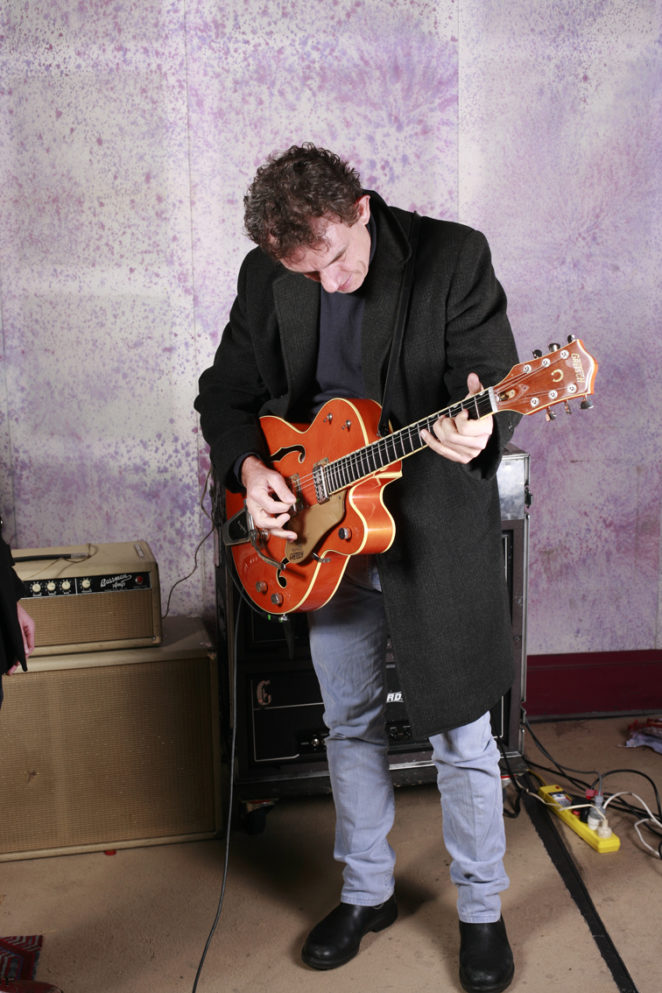 GP: What about up and coming players? Do you see anyone coming through to take the mantle?
GP: What about up and coming players? Do you see anyone coming through to take the mantle?
IM: I don’t but that’s just because I’m not really listening that often. I’m not out there seeing what’s around. I’m sure there are many.
CC: For me there is a distinct lack of guitar solos on the radio and I tend to look out more for a great song more rather than great players. I mean look at Cold Chisel. They had just so many great songs. Guitar playing is nothing without a great song underneath.
IM: With Chisel, the song always came first. Don Walker was fussy down to the last syllable of every word.
CC: But it shows though. You guys were never in danger of it being anything other than the song first. You listen to Chisel stuff and there was some amazing playing, or you could listen to it the other way around and go, ‘wow great playing but man, killer song’.
IM: The thing is if I have ever done any great guitar work on a Chisel song, it’s because of the song. If I really enjoy the song, I am listening to the lyric and the message in those lyrics and really trying to serve that guy or the people in the song, serve their suffering and do the right thing by them. Play for them and play them out of their horrible situation.
CC: That’s a good point. If you hear a great guitar solo, chances are there is something happening underneath to make it sound great as well. Just the right note choice.
IM: The right note choice, as Chris says, is not necessarily about technique. You can watch Yngwie Malmsteen all night and its pretty incredible the way he goes up and down the fretboard, and I couldn’t emulate him in million years but at the same time, at the end of it, how moved am I? As opposed to some guy who just picks the right note, the right feel, you know vibrating on this note, none on that. He’s explained the song and that guy is going to win my heart hands down.
GP: One final one. One piece of advice for a young guitarist?
CC: Aside from not using too much gain and hacking into your guitar. They’ve already learned quite a bit.
IM: My advice is to be completely open and to listen to everything and anything and take, steal, beg, borrow, from everyone.
CC: I hate this question because what works for me doesn’t necessarily work for others, but what is there 12 notes in music? Choose them wisely. Something I wish I had done rather than just play as fast as possible. What else … keep the ears open. I cant stand it when people limit themselves. Every style of music is a combination of everything that has come before it. The only way to find your voice is to embrace different styles and try to play as much as possible. I’m really glad that I did that and tried to like it all.
IM: Hear! Hear!
We headed back to the rehearsal studio, where Ian was keen to check out Chris’s gear and was particularly fond of his collection of Gretsch guitars. Mossy had a bit of a fang on one and suggested he might even invest in a Gretsch for future use. Chris also had his own signature model Gretsch prototype in his rack. The Gretsch people in the USA are currently tweaking a few elements before Chris gives the all clear for them to put the model on the market, hopefully before the end of the year.
Ian Moss’s new album ‘Let’s All Get Together’ is out now on Liberation Blue. The Living End’s current release is ‘State of Emergency’ through EMI.
